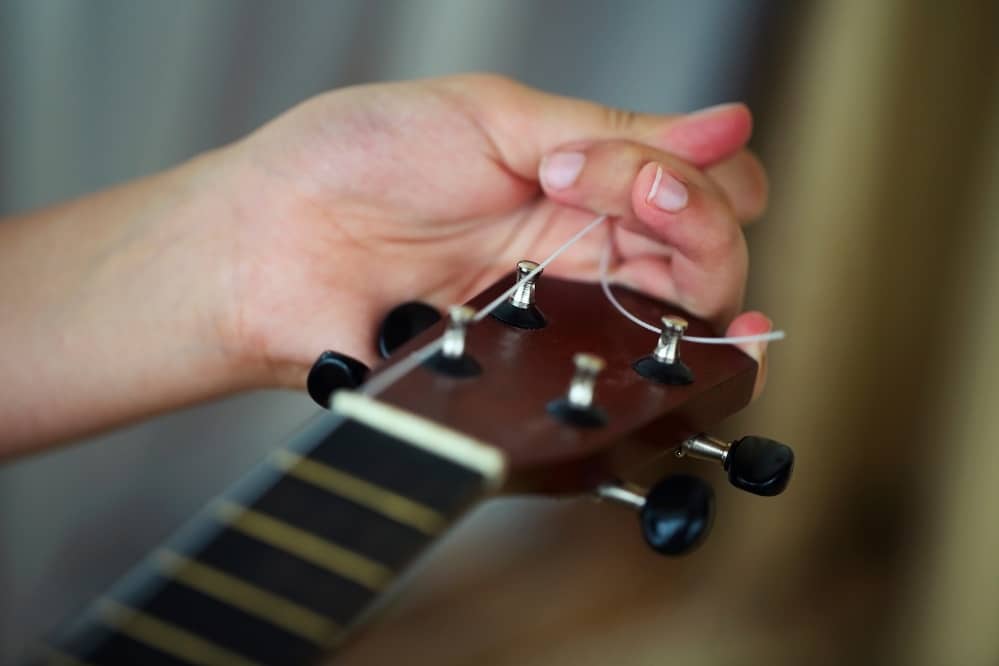When you play a stringed instrument such as a ukulele, you will eventually have to change your strings. People know that they have to replace strings when they break, but you shouldn’t wait until that time. There are a number of different factors that you need to consider. How long your ukulele strings last depends on how often you play it, but they generally last from eight months to a year.
What Are the Signs That It’s Time to Change the Strings?
When you play the ukulele, you will notice changes in how it sounds over time. The key is to know what to look for as signs that it is time to change your strings. Take a look at some of the signs that it is time to change your ukulele strings.
1. You Notice a Change in the Tone
One of the first signs that it’s time to change your strings is a change in the tone. You might notice that your ukulele sounds dull or flat. This is what happens when your strings are wearing out. New strings sound vibrant and put forth a rich tone. If your strings are sounding lifeless, you should go ahead and change them.
2. You Notice Changes to the Strings
Another sign that it is time to change your ukulele strings is that you have flat spots or grooves on the strings. When you play the ukulele, you are applying pressure to push the string against the fret. You also pick or strum the strings to play it. The pressure on the string will cause wear and tear over time, and you may notice a small line or indention in the string. If you can’t see anything, try running your finger along the strings to see if you can feel any grooves. If you do, it is time to replace the strings because if you wait too long, they will break.
3. You Have Trouble Holding Your Tune
If your ukulele has trouble holding its tune, you may need to replace your strings. Your ukulele strings will stretch over time, and eventually they will have stretched to the point where they are no longer able to hold the tune. If you tune your ukulele and then notice that it is losing its tune while you are playing, it is definitely time to replace the strings.
Why Do Ukulele Strings Need to Be Changed?
You probably know that your ukulele strings will eventually break if you don’t change them. However, you don’t want to wait until this happens. The problem is that people aren’t often taught how to care for their ukulele when they take lessons to learn how to play. Many ukulele players learn by experience, and they come up with a plan that works for them. It is important to know why you need to replace your ukulele strings so that you know what to look for.
1. Oils and Dirt From Your Fingers
One of the reasons that you need to change your ukulele strings is the oils and dirt from your fingers. When you play this instrument, the sweat, acids, and oils from your fingers get on the strings along with any dirt you may have. Over time, it can build up and change the way the strings vibrate. They will sound dull and lifeless. It happens slowly, but you can plan ahead because it is going to happen.
2. Your Strings Stretch Over Time
Another reason that ukulele strings need to be changed is that they stretch over time. The strings carry between 20 and 40 pounds of pressure depending on the size of your ukulele, and when they are stretched out, they won’t hold the tune as well. In addition, it will go out of tune more frequently.
3. The Strings Will Break If They Aren’t Changed
If you leave the same strings on the ukulele indefinitely, they will eventually break. The wear and tear will eventually get the best of the strings. You don’t want to wait until a string breaks to replace it because the ukulele won’t sound right if you only change one of the strings. You need to learn how long your strings last based on how many hours you play it, and change all of the strings at once before any of them break. If you do end up with a broken string, be sure to replace all of the strings at the same time to get the best sound out of the ukulele.
What Kinds of Ukulele Strings Are There?
Ukulele strings are made from different materials and come in different sizes. You need to know whether your ukulele is a soprano, concert, tenor, or baritone, and you need to know if it has ball end strings or strings that need to be tied. Different materials are discussed below.
1. Gut
Gut is a material that is medium in density, and they are made for high tension. They give you a brighter tone than other strings, and they have a gritty feel to them. Some players like the way these strings feel; this is especially true of classical musicians. In fact, in the past, nearly all strings were made from this material.
2. Nylon
Nylon is less dense, and these strings have a larger diameter. They are smooth and give you a warm tone. They are the most common strings for the ukulele, and they are popular, easy to find, and relatively inexpensive.
3. Fluorocarbon
These strings are a newer type, and they are a little bit louder and brighter than nylon. They are denser than nylon, and they hold tuning better. They can last longer than other types of strings.
4. Wound
The wound strings are the least common, and they sound different. They are louder than other types of strings, and they are used for low-G tuning. They usually have more volume and presence than other strings.
Final Words
When you play the ukulele, you will need to change your strings when they wear out. Make sure that you learn the signs that it is time to change your strings, and change them before they break.




